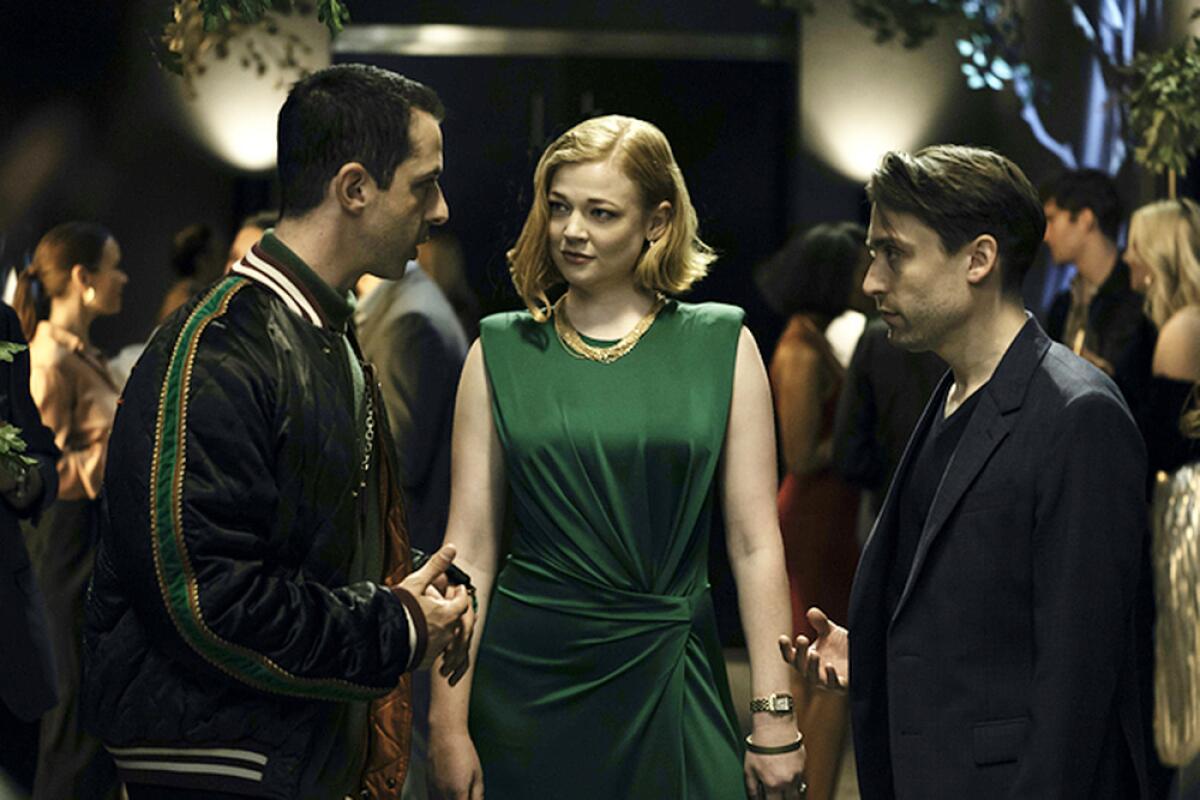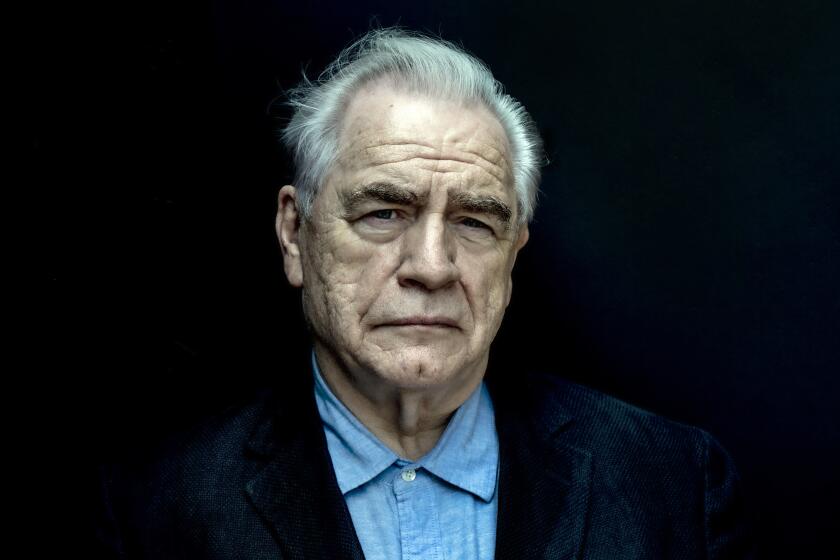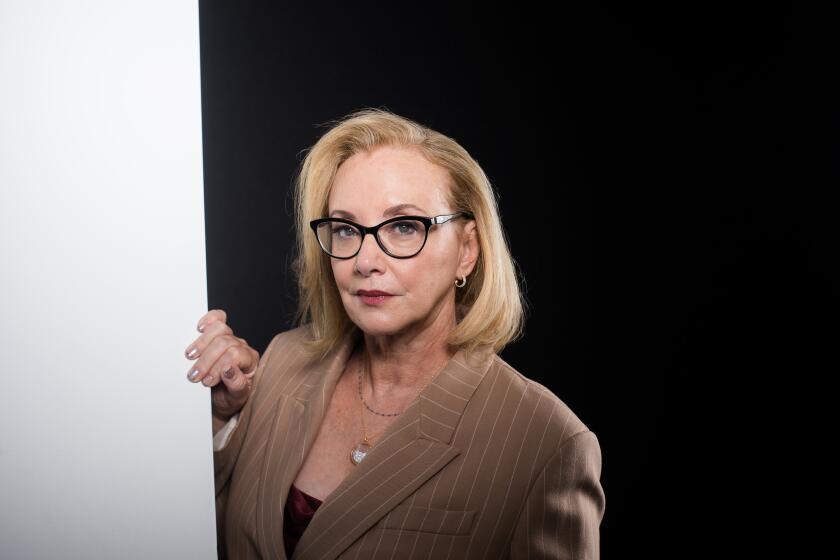The major miscalculation behind ‘Succession’s’ most Shakespearean season

- Share via
Logan Roy, the patriarch of the HBO series “Succession,” is every inch an irascible king. Cut from the same cloth as Rupert Murdoch, he lords over his right-wing media kingdom with a dyspeptic ferocity that routinely erupts in a two-word kiss-off that can’t be printed in a family newspaper.
Ruthless in battle, he reserves his cruelest weapon, his bludgeoning wit, for those in his inner sanctum. With a single withering remark, he can cut the legs out from under one of his adult children grown too big for their britches.
If Logan at times resembles a King Lear transported to 21st century New York, it’s not simply because the character is played by the inestimable Brian Cox, an actor who successfully tackled the role of Lear in a Royal National Theatre production that toured the world and wrote a book, “The Lear Diaries,” on the experience.
In the third season of “Succession,” the Shakespearean parallels have grown more pronounced. Logan’s empire is under siege after Kendall (Jeremy Strong), the self-appointed filial successor to the throne, refused to be the fall guy for the company’s misdeeds.
Actor Brian Cox is having a major moment thanks to the success of HBO’s “Succession” and a starring role as Lyndon B. Johnson in “The Great Society,” now on Broadway.
To save his own skin and revenge himself on Logan, Kendall has turned whistleblower. He’s cooperating with the Justice Department while plotting to take control of Waystar Royco with or without his siblings, who are as reluctant to throw their lot in with their erratic brother as they are nervous to cross their formidable father.
In the past, Logan’s Lear-like connection wasn’t easy to disentangle from other Shakespearean dragon leaders. “I put Logan on a level of a Titus Andronicus, or even a Julius Caesar and certainly a King Lear,” Cox told the entertainment awards website Gold Derby in 2019.
Noted Shakespeare scholar Grace Ioppolo took issue on Twitter with my comparison between Logan and Lear. She rightly noted that Logan “doesn’t have Lear’s majesty” and made the case instead for Richard III: “Logan’s reshuffling of family allegiances reminded me of Richard III’s reshuffling of his courtiers.”
But brutal as Logan may be, he’s not a butcher. An early impression that Cox records in “The Lear Diaries” holds true for how he approaches his character on “Succession”: “I do think there are a lot of laughs in ‘Lear’; it’s a play with humor; and Lear’s a bit of a curmudgeon, a bit of a silly old boy.”
Like Lear, Cox’s Logan seems to have “ever but slenderly known himself,” as Regan remarks to Goneril about their rash father. His tunnel vision is both an accouterment of power and a tragicomic flaw. Logan’s imperious reaction to slights, his need to be worshiped by his children and the emotional value he places on loyalty suggest a paternal tenderness buried under protective layers of narcissism.
Ring any Shakespearean bells?
This season, the writers on “Succession” have been playing up the age-related debility and mental fogginess of their crotchety corporate monarch. Forced to put on a show of family unity in front of a key investor (played by Adrien Brody), Logan physically falters while angrily hiking with Kendall across a landscape that might as well be in the shadow of the cliffs of Dover.
In the next episode, as an all-important shareholder meeting decides his fate, Logan staggers around in a delirium induced by a urinary tract infection. Roman (Kieran Culkin), a favorite son who fills in for the fool with his jejune mockery, dubs his father a “piss-mad king.”
Logan mistakes Shiv (Sarah Snook), the daughter who’s been by his side throughout this corporate crisis, for his conspicuously absent wife. His hallucinations involve a dead cat under his chair. At this rate, it would not surprise me if the season finale had Logan railing at the heavens while wandering half-naked in a superstorm.
But Shakespeare isn’t the only playwright shaping the new season of “Succession.” David Mamet has emerged as a rival god in the writers room. A strong current of cynical humor has allowed the show to toggle between genres from its inception, but the series has gone into “Glengarry Glen Ross” overdrive since returning from the extended COVID-19 pandemic break.
The veteran actor made a minor role in HBO’s drama into a fan favorite. The spotlight has been ‘a singular experience,’ she says.
In the season opener, Kendall sets up his war cabinet in his ex-wife’s deluxe co-op, oblivious to the tranquility he’s trampling on with his Oedipal rages. The son who cringingly rapped at an event celebrating his dad’s half-century reign at Waystar Royco was always damaged goods. But a wave of ludicrous hipness — think millennial tech bro meets Don Jr. — has crippled Kendall’s chance of becoming a worthy foil for his father.
The hyperactive camerawork of the first episode works to keep pace with a script that’s written in the bing-bang-boom rhythm of a Mamet play, where the joke’s on everyone. The banter mucks around as happily in the psychological mud as it does in the corporate slime. Implicit is the notion that the game is only as absurd as its players.

Mamet’s savage comedy is closer to the ethos of our Trumpian age, and “Succession” rubs our noses in what we’ve become. What looks like an evening soap opera often behaves like a feral satire. That’s always been part of the fun, but so far this season the ruthless amusement has been coming at the expense of a deeper involvement.
Shakespeare’s greatest tragedy contains behavior far more depraved than anything dreamt of in Mamet’s philosophy. But the vision of humanity in “King Lear” is far more capacious than the jaded worldview pervading “Glengarry Glen Ross.” Darkness is visible only because of the light that refuses to be snuffed out.
Moral perversion exists side by side in Shakespeare’s tragedy with beneficent strength. Murder, betrayal, even torture — horrifically depicted in the infamous gouging of the Earl of Gloucester’s eyes — have become commonplace in a world plunged into disorder by lust, envy, greed and the rest of the deadly sins.
But if the heroic has been forced into retreat in Lear’s topsy-turvy world, compassionate goodness hasn’t relinquished the battle. By contrast, in Mamet’s universe, much like in Trump’s America, there are winners and losers. The goal is to talk oneself onto victory’s side even in the wake of a humiliating defeat.
These would-be badasses of “Succession” can be hilarious to eavesdrop on. But a dramatic style constructed out of sardonic words and corrosive sentiments is best reserved for short sprints. Halfway into the season opener, I felt as though I were running out of gas. How would the writers manage to sustain this Mamet card trick?
Now that we’re seven episodes into the third season, I think it’s safe to say they haven’t. There have been intermittent successes. “Retired Janitors of Idaho,” the episode in which an addled Logan is carted to the men’s room while a backroom deal is racing against the shareholder clock, struck just the right balance between audacious parody and dramatic tension.
But the next episode, “What It Takes,” a political satire set at a conference of conservative thought leaders who have gathered to pick the next Republican presidential candidate — or, rather, to await kingmaker Logan’s choice from among the different candidates his children are backing — was too clever by half. The most recent episode, “Too Much Birthday” — set on the occasion of Kendall’s obscenely lavish 40th birthday gala — allowed the siblings to tediously run riot with their rivalrous pathologies.
What is left to sustain our interest in a Lear who lacks poetic majesty and four selfish scions without a speck of the principled goodness Shakespeare highlights in Cordelia? There’s not even a loyal Kent or a devoted Edgar among the executive courtiers. Instead, a clownishly volatile Tom (Matthew Macfadyen) schemes while wallowing in self-pity as Shiv’s neglected husband; Gerri (J. Smith-Cameron) accepts being a cardboard CEO while diddling on the side with Roman; and dorky, earnest cousin Greg (Nicholas Braun) tacks with the wind while admiring the swag that happens to fall his way.
‘Succession,’ in Season 3, sinks deeper into evil — maybe a perfect story for our times.
Fans of the show have had to make do with a stinging lampoon of the debased billionaire class. A 90-minute play by one of Mamet’s disciples might more potently make the same point.
I continue to look forward to my Sunday night fix, but the drop-off in emotional substance is a major miscalculation.
Sometimes I hope that Logan will deliver a punishing lesson to his grasping kids, including his eldest, Connor (Alan Ruck), the Zeppo Marx of the lot, who’s been entertaining delusions of White House grandeur. Sometimes I want Kendall to miraculously transcend his stunted psychological development and liberate his father’s media kingdom from the forces of darkness — or, at the very least, go bankrupt trying. Sometimes I long to see Shiv make good of her name and stab Roman in the back, because someone has to silence this vindictive potty mouth.
Still, interest in shifting allegiances, like rat-a-tat satire, is a short-term solution, and for now, “Succession” feels diminished by its lowered dramatic sights. Perhaps our era no longer accommodates epic journeys of self-knowledge. But if tragic reckoning is beyond this cast of characters, there’s too little “Lear” in the series, not too much. A slow-simmering American tragedy has become a laughing matter.
‘Succession’
Where: HBO
When: 9 p.m. Sunday
Rating: TV-MA (may be unsuitable for children under age 17)
More to Read
The complete guide to home viewing
Get Screen Gab for everything about the TV shows and streaming movies everyone’s talking about.
You may occasionally receive promotional content from the Los Angeles Times.










